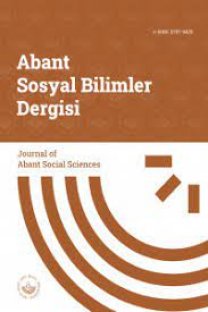TEDARİK ZİNCİRİ YÖNETİMİ BOYUTUYLA KURUMSAL SÜRDÜRÜLEBİLİRLİK VE FİNANSAL PERFORMANS İLİŞKİSİ: BİST SÜRDÜRÜLEBİLİR ENDEKSİNDE YER ALAN FİRMALARDA BİR ARAŞTIRMA
Kurumsal Sürdürülebilirlik, Tedarik Zinciri Yönetimi, Finansal Performans, BİST Sürdürülebilirlik Endeksi
___
- Ageron, Blandine, Gunasekaran, Angappa ve Spalanzani, Alain (2012). “Sustainable Supply Management: An Empirical Study”, International Journal of Production Economics, 140 (1): 168-182. Ameer, Rashid ve Othman, Radiah (2012), “Sustainability Practices and Corporate Financial Performance: A Study Based On The Top Global Corporations”. Journal of Business Ethics, 108 (1): 61-79. Ashford, Nicholas (1993). “Understanding Technological Responses of Industrial Firms to Environmental Problems: Implications For Government Policy”. Environmental Strategies For İndustry: International Perspectives On Research Needs and Policy İmplications. Ed. K. Fischer, ve J. Schot. Washington DC: Island Press. 277-307. Barnett, Michael L. ve Salomon, Robert M. (2012). “Does It Pay To Be Really Good? Addressing The Shape of The Relationship Between Social and Financial Performance”. Strategic Management Journal, 33 (11): 1304-1320. Carroll, Archie B. (1991). "The Pyramid of Corporate Social Responsibility: Toward The Moral Management of Organizational Stakeholders”. Business horizons 34 (4): 39-48. Carter, Craig R. (2005). “Purchasing Social Responsibility and Firm Performance: The Key Mediating Roles of Organizational Learning and Supplier Performance”. International Journal of Physical Distribution & Logistics Management, 35 (3): 177-194. Cruz, Jose. M. (2008). “Dynamics of Supply Chain Networks With Corporate Social Responsibility Through İntegrated Environmental Decision-Making”. European Journal of Operation Research, 184 (3):1005-1031. Cruz, Jose. M., ve Wakolbinger, Tina. (2008). “Multi-Period Effects of Corporate Social Responsibility On Supply Chain Networks, Transaction Costs Emissions, and Risk”. International Journal of Production Economics, 116 (1): 61-74. Çetinkaya, Balkan, Cuthbertson, Richard, Ewer, Graham, Klass-Wissing, Thorsten, Piotrowich, Wojciech ve Tyssen, Christoph (2011). Sustainable Supply Chain Management, New York: Springer. Daly, Herman E. ve Cobb, J. (1994). For The Common Good, Boston: Beacon Press. Erol, İsmail ve Özmen A. (2008). “Çevresel Düzeyde Sürdürülebilirlik Performansının Ölçülmesi: Perakende Sektöründe Bir Uygulama”. İktisat, İşletme ve Finans Dergisi, 23 (266): 70–94. Gosselin, Maurice (2005). “An Empirical Study of Performance Measurement In Manufacturing Firms”. International Journal of Operations and Production Management, 54 (5/6): 419–437. Hoejmose, Stefan, Brammer, Stephen ve Millington, Andrew (2013). “An Empirical Examination of The Relationship Between Business Strategy and Socially Responsible Supply Chain Management”, International Journal of Operations & Production Management, 33 (5): 589-621. Hofer, Christian, Cantor, David E. ve Dai, Jing. (2012). “The Competitive Determinants of A Firm’s Environmental Management Activities: Evidence From US Manufacturing İndustries”. Journal of Operations Management, 30 (1): 69-84. Inoue, Yuhei ve Lee, Seoki. (2011). “Effects of Different Dimensions of Corporate Social Responsibility on Corporate Financial Performance in Tourism-Related İndustries”. Tourism Management, 32 (4): 790-804. Kemp, Rrnr. (1993). “An Economic Analysis of Cleaner Technology: Theory and Evidence”. Environmental Strategies For İndustry: International Perspectives On Research Needs and Policy İmplications. Ed. J. Schot, K. Fischer. Washington DC: Island Press. 79-113. Kogg, Beatriss, ve Mont, Oksana. (2012). “Environmental and Social Responsibility in Supply Chains: The Practice of Choice and Inter- Organisational Management”. Ecological Economics, Volume 83, 154-163. Krajewski, Lee. J., Ritzman, Larry. P. ve Malhotra, Manoj. K. (2010). Operations Management: Process and Supply Chains, (9. cilt), New York: Pearson. Lopez, Victoria M., Garcia, Arminda, ve Rodriguez, Lazaro (2007). “Sustainable Development and Corporate Performance: A Study Based on The Dow Jones Sustainability Index”. Journal of Business Ethics, 75: 285–300. McWilliams, Abagail ve Siegel, Donald S. (2000). “Corporate Social Responsibility and Financial Performance: Correlation Or Misspecification?”. Strategic Management Journal, 21 (5): 603- 609. Min, Hokey ve Kim, Ilsuk (2012). “Green Supply Chain Research: Past, Present, and Future”, Logistics Research, 4 (1-2). 39-47. Mustaruddin, Saleh, Norhayah, Zulkifli, Rusnah Muhamad, (2011),"Looking For Evidence of The Relationship Between Corporate Social Responsibility and Corporate Financial Performance In An Emerging Market". AsiaPacific Journal of Business Administration, 3 (2): 165 – 190. Orlitzky, Marc, Schmidt, Frank L. ve Rynes, Sara L. (2003) “Corporate Social and Financial Performance: A Meta-Analysis”. Organization Studies, 24 (3): 403-441. Peidro, David, Mula, Josefa, Poler, Raul ve Lario, Francisco C. (2009). “Quantitative Models For Supply Chain Planning Under Uncertainty: A Review”. International Journal of Advanced Manufacturing Technology, 43 (3-4): 400-420. Rao, Purba ve Holt, Diane (2005). “Do Green Supply Chains Lead to Competitiveness and Economic Mperformance?”, International Journal of Operations & Production Management, 25 (9): 898-916. Sarkis, Joseph ve Cordeiro, James J. (2001). “An Empirical Evaluation of Environmental Efficiencies and Firm Performance: Pollution Prevention Versus End-Of-Pipe Practice”. European Journal of Operational Research, 135 (1): 102-113. Seuring, Stefan ve Muller, Martin. (2008). “From A Literature Review to A Conceptual Framework For Sustainable Supply Chain Management”. Journal of Cleaner Production, 16 (15): 1699 – 1710. Sönmez, Feriştah (2004). “İşletmelerin Sosyal Sorumluluğu ve Çevre Sorunlarında Ekonomik Yaklaşımlar”. Yaklaşım Dergisi, 133: 476- 490. Utkutuğ, Çağla P. (2008). “Kurumsal Performans Yöntemi Olarak Toplam Başarı Göstergesi Yöntemi”. Gazi Üniversitesi Endüstriyel Sanatlar Eğitim Fakültesi Dergisi, 23: 55–78 Wang, Zhihong. ve Sarkis, Joseph. (2013). “Investigating The Relationship of Sustainable Supply Chain Management With Corporate Financial Performance”. International Journal of Productivity and Performance Management, 62 (8): 871–888. Yu, Vincent, Ting, Hisiu I. ve Wu, Yen-Chun J. (2009). “Assessing The Greenness Effort For European Firms: A Resource Efficiency Perspective”. Management Decision, 47 (7): 1065-1079. Zhu, Qinghua, Sarkis, Joseph ve Geng, Yong (2005). “Green Supply Chain Management in China: Pressures, Practices and Performance”. International Journal of Operations & Production Management, 25 (5): 449-468.
- Yayın Aralığı: Yılda 3 Sayı
- Başlangıç: 2000
- Yayıncı: Abant İzzet Baysal Üniversitesi Sosyal Bilimler Enstitüsü
FEN BİLGİSİ ÖĞRETMEN ADAYLARININ GERİ DÖNÜŞÜM KAVRAMI HAKKINDAKİ FARKINDALIKLARI
Bilal ŞİŞMAN, Mesut DOĞAN, Veysel AĞCA
FİNANSAL GELİŞME VE YOKSULLUĞUN AZALMASI ARASINDAKİ İLİŞKİ: AMPİRİK BİR İNCELEME
Muhammet BELEN, Hüseyin KARAMELİKLİ
SOSYAL AĞ TÜRLERİNİN KARŞILAŞTIRILMASINA İLİŞKİN BİR AĞ ANALİZİ
Keziban SEÇKİN CODAL, Erman COŞKUN
SPOR YAPAN VE YAPMAYAN BİREYLERİN ÖFKE KONTROL TARZLARININ İNCELENMESİ
Hanifi ÜZÜM, Mustafa ORHAN, Ünal KARLI, Mustafa Kemal DUŞ, Gamze YERLİKAYA, Hulusi GÖKGÖZ
HEMŞİRELİK ÖĞRENCİLERİNİN TOPLUMSAL CİNSİYET ROLLERİNE İLİŞKİN TUTUMLARI
Meryem AYDIN, Ebru ÖZEN BEKAR, Şerife YILMAZ GÖREN, Mehmet Ali SUNGUR
BÜTÇE AÇIKLARI ENFLASYONİST ETKİYE SAHİP MİDİR? TÜRKİYE ÜZERİNE UZUN DÖNEMLİ ANALİZ
